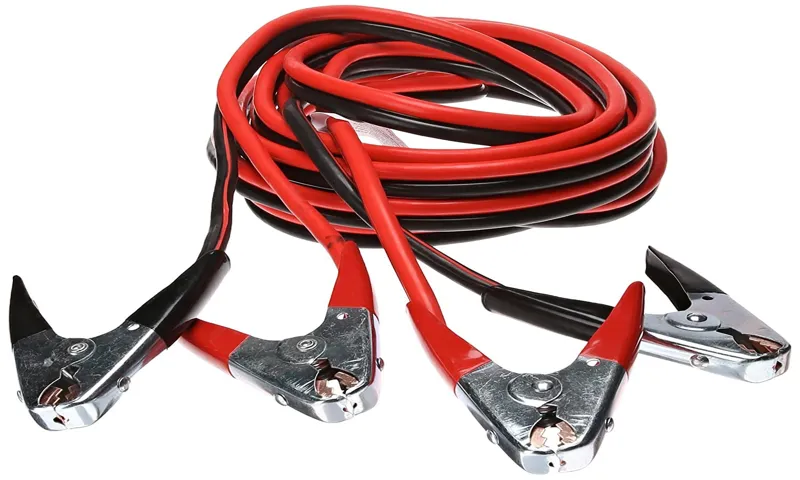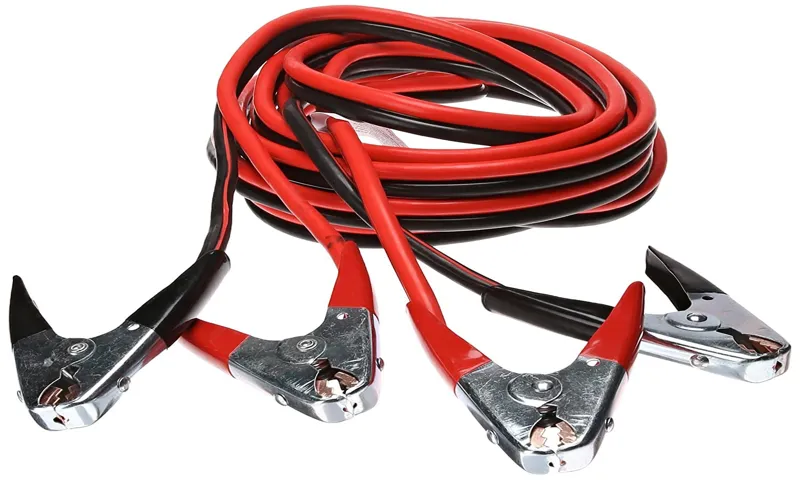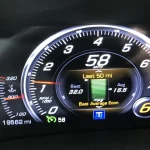Jumper cables are an essential tool to have in your car for emergency situations. They can be used to jump-start your vehicle if the battery dies or if it gets too cold outside. However, when you’re searching for a new set of jumper cables, one of the most important factors to consider is the gauge of the wire.
But what gauge wire are jumper cables? In this blog post, we’ll take a deep dive into jumper cables and discuss their wire gauge, why it’s important, and what gauge you should look for when purchasing a set of jumper cables. So buckle up and let’s get started!
Table of Contents
Introduction
Jumper cables are a necessary tool to have in case of a dead car battery. However, not all jumper cables are created equal. When it comes to the gauge of wire used in jumper cables, it can make a significant difference in the ability to transfer power from one battery to another.
The gauge of wire used in jumper cables typically ranges from 4 to 8 AWG (American Wire Gauge). The most common gauge used in consumer-grade jumper cables is 4 AWG, which is suitable for most vehicles. However, for larger or more powerful vehicles, it may be necessary to use jumper cables with a lower gauge, such as 2 or 1 AWG, to ensure proper power transfer.
When in doubt, it is always best to consult the owner’s manual for the vehicle to determine the appropriate gauge of wire for the jumper cables needed in case of emergency. Remember, having the right gauge jumper cables can make all the difference in getting your car back on the road.
Explanation of Jumper Cables
Jumper cables are an essential tool to have in your car’s emergency kit. These cables are a pair of insulated wires with clamps at each end used to jump-start a dead battery. Anyone who has experienced a dead battery knows the frustration it can cause.
It could be due to something as simple as the car lights left on overnight, or something more serious like a malfunctioning alternator. Either way, it’s important to have a set of jumper cables on hand to get you out of a tricky situation. Using jumper cables correctly can be a real lifesaver and save you the cost of a tow truck.
The process is straightforward, attach positive (+) and negative (-) clamps to the corresponding terminals of each car battery, then start the car with the good battery, letting the engine run for several minutes. Finally, try to start the stalled vehicle, and when it starts, remove the cables in reverse order.

What Gauge Wire Means
As an aspiring electrician or a DIY enthusiast, you may have come across the term “wire gauge.” But what is wire gauge, and why is it important to understand it? Wire gauge refers to the thickness or diameter of a wire. It is a standardized measurement system used to determine the amount of electrical current a wire can safely carry without overheating or causing a fire.
Electrical wires are classified by gauge number, with smaller gauge numbers indicating thicker wires capable of carrying more current. For instance, a 14-gauge wire is thicker and can carry more current than a 22-gauge wire. Understanding wire gauge is crucial to ensure that you use the right wire size for your electrical projects to prevent potential hazards.
Determining Gauge of Jumper Cables
If you’re wondering what gauge wire your jumper cables have, there are a few things to look for to determine their thickness. The gauge of a wire is determined by its diameter, with a lower gauge meaning a thicker wire. Jumper cables may come in a variety of gauges, but the most common gauges are 4, 6, 8, and
The thicker the wire, the more powerful it is and the more current it can carry. For most cars, a 6-gauge wire is sufficient, but if you have a larger vehicle or need to jump-start in very cold weather, you may want to go with a thicker 4-gauge wire to ensure enough power is transferred. Be sure to check your car’s manual or contact a professional to determine the appropriate gauge for your specific needs.
Measuring Cable Diameter
When it comes to determining the gauge of jumper cables, one important aspect to consider is measuring the cable diameter. This can be a challenging task, but it’s crucial to ensure that the jumper cables can handle the amount of current required. One method that can be used to measure cable diameter is using a digital caliper, which can provide accurate measurements to the nearest thousandth of an inch.
It’s important to measure at several points along the cable to account for any variations in diameter. Another method is using a wire gauge chart, which can help determine the gauge based on the measured diameter. It’s also important to note that the gauge of jumper cables should be suitable for the vehicle being jumped, as using cables with a lower gauge than necessary can lead to overheating or even a fire.
By taking the time to accurately measure cable diameter and choose the appropriate gauge, you can ensure safe and reliable use of jumper cables.
Looking at Cable Packaging or Labels
Determining the gauge of jumper cables is important to ensure that they match the requirements of your vehicle. The gauge of a cable is indicated by a number, with a lower number indicating a thicker wire, and a thicker wire can handle more current without overheating or suffering from power loss. When looking at cable packaging or labels, you can typically find the gauge number listed along with other specifications.
It is important to note that using cables with an insufficient gauge can lead to a number of problems, including damage to your vehicle or even injury to yourself. So, when purchasing jumper cables, always make sure to check the gauge number to ensure that they are a good match for your vehicle.
Common Gauge Sizes for Jumper Cables
What gauge wire are jumper cables? Jumper cables are an essential tool for any vehicle owner, and they come in various sizes based on a wire’s gauge. The most common gauge sizes are 4, 6, and A 4-gauge wire is the thickest, and it’s suitable for heavy-duty vehicles like trucks.
A 6-gauge wire is suitable for most cars, while an 8-gauge wire is great for smaller vehicles like motorcycles. It’s important to consider the gauge size when purchasing jumper cables since the thicker the wire, the more current it can carry. Thicker cables are also less likely to rapidly heat up during use, making them safer and more effective than thinner cables.
So, always choose the right gauge size for your vehicle to ensure that your jumper cables work excellently when you need them.
6 Gauge
When it comes to picking out the right size of jumper cables, it’s essential to consider the gauge. The gauge size indicates the thickness of the cable, and the most common gauge for jumper cables is 6 gauge. This size is an excellent choice for most vehicles because it provides a reliable and safe jump, and it’s not too bulky to store in your trunk.
Jumper cables with a 6 gauge size can handle most regular cars, trucks, and SUVs, so it’s a good option to have on hand in case of an emergency. However, it’s important to note that larger vehicles, such as RVs or heavy-duty trucks, may need a thicker gauge size to jump properly. Regardless, having a set of 6 gauge jumper cables is an excellent addition to your car’s emergency kit and can save you from being stranded on the side of the road.
4 Gauge
If you’re in the market for jumper cables, understanding the common gauge sizes is important to ensure you select the right ones for your needs. The gauge size refers to the thickness of the wire inside the cable, with a higher number indicating a thinner wire. One common gauge size you’ll come across is 4 gauge, which is suitable for most vehicles.
It can handle a range of power needs and is a good choice for everyday use. If you have a larger vehicle or need to jump start trucks or RVs, then a thicker gauge size may be necessary. However, for most drivers, 4 gauge jumper cables will do the job and provide peace of mind in case of emergencies.
Just remember to always handle them safely and follow proper instructions to avoid injury.
2 Gauge
When it comes to jumper cables, the size of the cable matters. One common gauge size is 2 gauge, which refers to the thickness of the cable. A 2 gauge cable is larger and thicker than a 4 gauge cable, allowing it to carry more current and handle bigger loads.
This makes it a great option for larger vehicles like trucks and SUVs. However, keep in mind that a 2 gauge cable can be heavier and harder to maneuver than a smaller gauge cable. It’s important to choose a cable size that matches the needs of your vehicle, so be sure to consult your owner’s manual and consider factors like engine size and battery type.
Overall, a 2 gauge jumper cable can be a reliable tool in your vehicle emergency kit, providing peace of mind and assurance when you need it most.
Conclusion
In conclusion, determining the gauge of wire used in jumper cables is like determining the strength of a superhero. You can’t judge their abilities just by looking at them. You need to put them to the test (or in this case, measure their current-carrying capacity) to truly know their power.
So next time you’re wondering what gauge wire your jumper cables are made of, remember that their strength lies in their ability to rescue your car from a dead battery, not in their physical appearance.”
FAQs
What is the recommended gauge for jumper cable wires?
The recommended gauge for jumper cable wires is at least 4 AWG (American Wire Gauge) for most vehicles.
Can you use thinner gauge wires for jumper cables?
It is not recommended to use thinner gauge wires for jumper cables, as they may not provide enough current to start the vehicle and may even overheat and damage the wires.
How long should the jumper cables be?
The jumper cables should be at least 10-12 feet long to easily reach from one vehicle’s battery to another.
Can I use household electrical wire for jumper cables?
No, household electrical wire is not suitable for jumper cables as it is not designed to handle high current flow and may become damaged or even cause a fire.
What is the maximum amperage jumper cables can handle?
Depending on the gauge of the wires, jumper cables can handle up to 600 amps or more.
Can I use damaged or frayed jumper cables?
No, using damaged or frayed jumper cables can be dangerous and may cause electrical shock or fires.
Do I need to connect the negative jumper cable to the dead battery?
No, it is recommended to connect the negative jumper cable to a grounded metal part of the vehicle’s frame away from the battery to avoid sparks.



